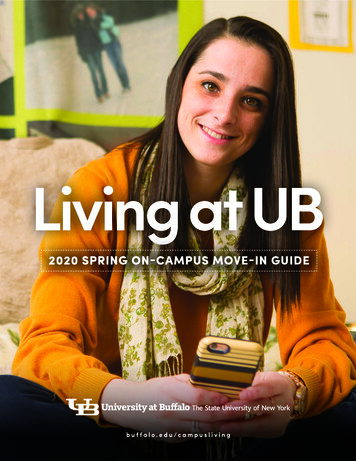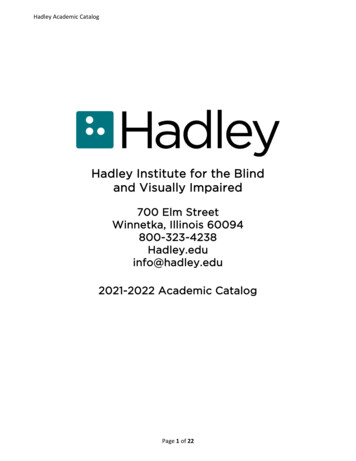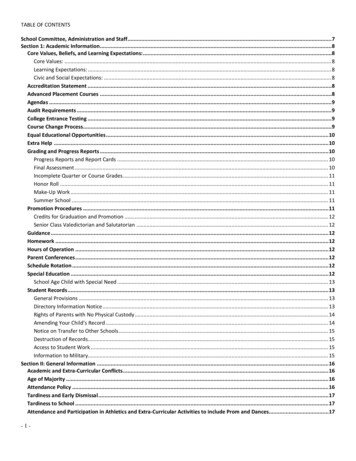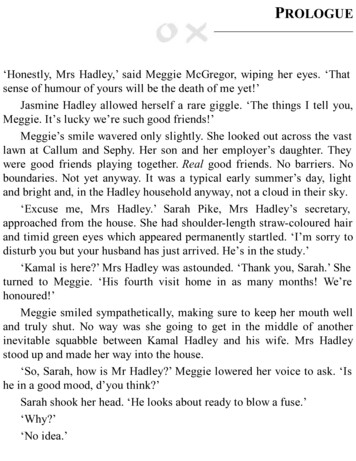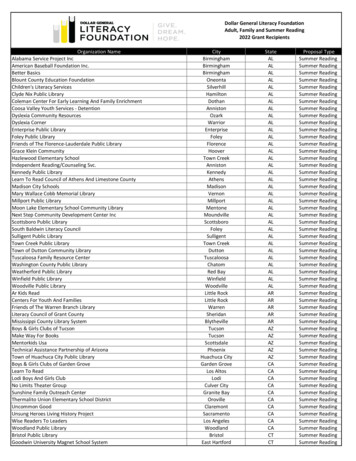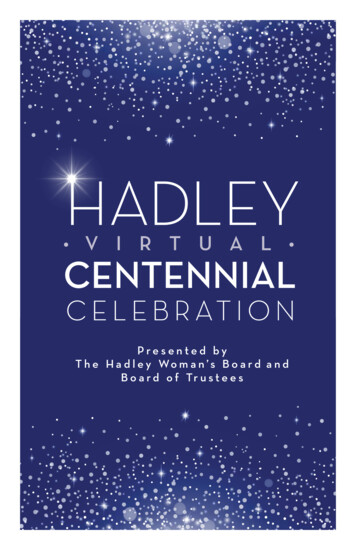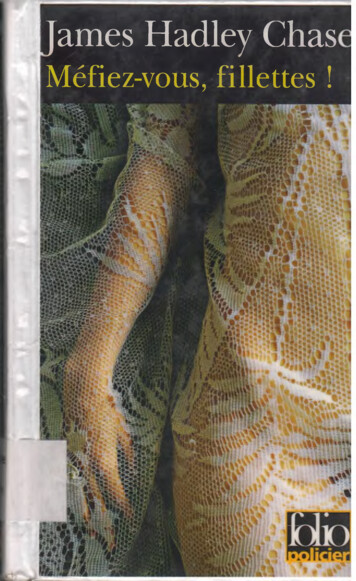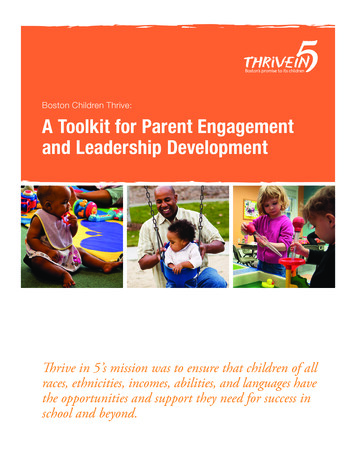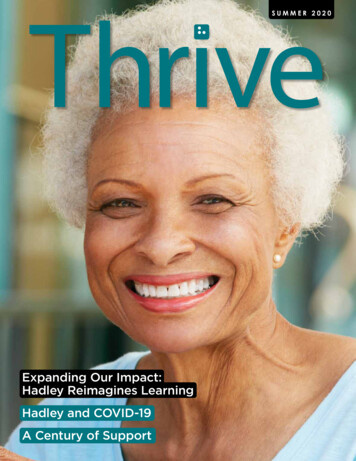
Transcription
ThriveSUMMER 2020HExpanding Our Impact:Hadley Reimagines LearningHadley and COVID-19A Century of Support
inside this issue.A Century of Support45 Nancy Jones: A Lasting Legacy6 Hadley Reimagines LearningHadley and COVID-198Finding Reasurrance in CrisisAspiring to Inspire Others109Vision Support Groups Zoom into the Future12Teaching the ProfessionalsWhile Hadley learning wasalways free to individualswho are blind or visuallyimpaired and their families,professionals in the visualimpairment field paid a smallfee for continuing educationcourses. Your support is nowenabling these professionalsto learn free of charge aswell, so they can build theirown skills and better servetheir clients in the future.Eliminating the fee forprofessionals led to anunprecedented level ofparticipation. Since midMarch there have beennearly 1,600 participantsin Hadley’s continuingeducation courses,compared to only nine2HThrive Summer 2020in the three-month periodbefore this.Anshuman Agarwal, seniorprogram manager at Indiabased Vision-Aid, shares,“I encourage staff to learnfrom Hadley and takeadvantage of downtimedue to COVID, and they aremaking excellent progress.”One of these professionals—Krishka Pachauri, a visuallyimpaired instructor fromAgra, India—writes, “Hadley’sonline education platformgave me such a remarkableopportunity to learn subjectswhich help me tackle theproblems I face daily due tomy own low vision. Beyondthat, I am finding it veryuseful in training others.”Vision rehabilitation therapist andHadley learner, Amanda GeorgeIn Alabama, visionrehabilitation therapistAmanda George has takenHadley courses for herpersonal and professionallearning. She now uses hertime to participate in Hadleydiscussion groups, learningfor the benefit of her clients.Amanda is also a valuablecontributor to these forums,sharing her own ideas andresources with the group.
A Letterfrom Julie Tye.loss. Thanks to the generosityof our donors, Hadley is hereto help with this difficulttransition so these individualscan continue to thrive in theirhomes, work and communities.he last few monthshave been challengingfor everyone. Underthe cloud of COVID-19we have been navigating a newreality—facing uncertainty,confined to our homes andunable to visit in person withloved ones.This has been Hadley’s missionover the past century and ournew learning platform ensuresthat we will be able to bestserve everyone who needs ourresources into the future. Youmay have read about our plansfor this reimagined approachin previous issues. Now, I amexcited to share that it hasbeen successfully launched!See page 6 for more.For many people who arevisually impaired, feelings offear and isolation are not new.Vision loss makes it dangerousto move about in the world,difficult to manage daily tasksor continue beloved hobbies.This often leads to feelings offrustration, loneliness, anxiety,and depression.This builds on Hadley’sesteemed history of distancelearning. The importance ofthis distance learning modelhas been well proven with therecent pandemic as schools,institutions and organizationsacross the world have beenramping up their capabilities toreach those sheltered at home.In the future, millions ofAmericans with age-relatedeye diseases will experiencethese challenges and emotionsas they adjust to life with visionWhile other agencies thatwork with the visually impairedpopulation were forced to closetheir doors due to socialdistancing measures, yourTgenerosity has enabledHadley to fill the gap withneeded information, resourcesand learning (see page 8).The blind and visually impairedcommunity has taken noticeand we have experienced atremendous increase in trafficto our website, participationin our forums and views of ourvideos. With a 100-year headstart in distance learning, wehave seamlessly met thisdemand to expand Hadley’sreach and impact.Everything Hadley doesis made possible by theassistance of you, oursupporters, who believe inour mission and partner withus to bring it to life. Thanksto you, Hadley is there forour learners whenever andwherever they need us—including in this time of crisis.Stay safe and well.Julie S. TyePresidentour missionHadley creates personalized learning opportunitiesthat empower adults with vision loss or blindness to thrive—at home, at work and in their communities.hadley.edu 800.323.4238H3
Thrive.at home, at work and in the communityA Century of SupportHadley Donors Make HistoryHadley learning hasalways been free ofcharge to people whoare blind or visuallyimpaired and their families.While prospects for people withvision loss are brighter thanthey were a century ago, todaymany live on a fixed incomeor are un- or under-employed.Hadley never wants cost to bea barrier to our learners.With this in mind, raising moneyto support the learning Hadleyprovides is integral to what wedo—and you, our donors, are anessential part of our history.STARTING LOCALWilliam Hadley, founder ofThe Hadley CorrespondenceSchool for the Blind, lived inWinnetka, IL, a northernsuburb of Chicago. Here hewas surrounded by friendsand neighbors who inspiredand supported his efforts.Key among these wasrenowned ophthalmologist,Dr. E.V.L. Brown, who workedclosely with Hadley to startthe school and would serve asHadley trustees raised funds forthe School’s headquarters4HThrive Summer 2020president of the organization’sBoard of Trustees until his deathin 1953. Among Dr. Brown’sfriends and patients were twobusiness leaders in the area—Douglas Smith, president of thePepsodent Company; and JohnScott, of Carson Pirie Scott—who wrote the first check of 1,000 to the school in 1921.Many others from the areawere generous with their timeand money, especially Hadley’sBoard of Trustees. In 1922, thegroup provided funds to movethe school from William Hadley’sliving room to a space whereit could expand operations.The board’s support has beeninstrumental throughout thecentury. Thanks to thegenerosity of its trustees, theschool survived the Depression.And, in 1951, this group raisedfunds to purchase the landwhere Hadley stands today.THE WOMAN’SBOARD IS BORNIn the 1950s, women in thecommunity stepped up to takea leading role by founding theWoman’s Board members sellingBraille Holiday CardsHadley Woman’s Board. In 1953,Hadley was in a precariousfinancial position and NancyBrown Jones, daughter of Dr.E.V.L. Brown, got to work. Sherecruited “unusually capable,bright, charming and wellorganized women who knewhow to get right to a problem.”Today, the Woman’s Boardis a special partner to Hadleyand its largest single donor.Since its founding 67 yearsago, the group has raisedmore than 5.6 million. Alarge percentage of theseproceeds are generatedthrough special events,including an annual gala thatbrings the local communitytogether in support of Hadley.Over the years, fundraisingevents have included dinnerdances, casino nights, KentuckyDerby parties and art sales.Highlights include Hadley’s 75thanniversary gala with BarbaraBush as the Honorary Chairman.Another longstanding Woman’sBoard tradition is the BrailleHoliday Card sale. Started byNancy Brown Jones in 1956, thecards include a holiday imagewith a message in both printand braille. A tradition formany families, the card extendsHadley’s reach worldwide.The Lion’s Club promotes Hadleyin the community
Thrive.in the communityTHE LIONS CLUBROARS INTO ACTIONLions Clubs International is aservice organization that countsblindness-related causes amongits projects. This mission wasinspired by Helen Keller, thefamous deaf-blind visionary,who appealed to the Lions Clubto become “Knights of the blindin the crusade against darkness”at their 1925 internationalconvention.In 1929, the Lions Clubs’ newlyformed Winnetka, IL, chapteradopted Hadley as its mainproject. This was fortuitoustiming as the school was ingreat need of financial support.The Winnetka Lions’ financialcontributions helped Hadleyduring the Depression, andtheir tireless efforts throughthe 1930s and 1940s raisedawareness of Hadley across theglobal Lions Clubs organization.By 1958, the Lions’ contributioncomprised a significant portionof the school’s income. When itwas time to expand the buildingin 1968, the Lions were there tohelp fund the renovation.INDIVIDUALS DRIVEFUNDRAISING TODAYFundraising at Hadley isdiversified across multiplesources. In 2019, the majority(62%) of contributions toHadley’s operating fund werefrom individual donors. Likeour learners, these individualsare from across the U.S. andaround the world. Gifts fromfoundations comprised another25% of operating fund donations.In addition, the Woman’s Boardand service clubs, such as theLions Clubs, continue to play animportant role—raising moneyand serving as ambassadors forHadley in their communities.Nancy Jones Leavesa Lasting LegacyNancy Brown Jones,founder of the HadleyWoman’s Board andHadley Trustee, died thisspring at the age of 103.Daughter of Hadley’sco-founder, Dr. E.V.L.Brown and Frieda KirchoffBrown, Nancy grew up inWinnetka, IL, graduatingfrom Smith College 1937.Bud and Nancy JonesIn 1940 she marriedClarence Boyd “Bud”Jones. The couple lived inWinnetka, where they raised three children.Nancy was an instrumental figure in Hadley’s survivaland growth. When the school was down to its last 500 and at risk of closing in 1953, she rallied friendsand acquaintances for critical financial support. Thisled her to start the Hadley Woman’s Board. She alsolaunched the Woman’s Board annual Braille HolidayCard sale from her dining room table in 1956. Thefirst charitable fundraiser of its kind, the annual salecontinues to be an important source of support tothis day.Bud Jones, Nancy’s husband, served as chair of theHadley Board of Trustees from 1953 until 1969. Nancyworked closely alongside him to promote the School,including spearheading the first building campaign andgoing door-to-door throughout the community to raisethe 250,000 required to build Hadley’s home at 700Elm Street in Winnetka. Nancy was first made a HadleyTrustee in 1941 and became a Life Trustee in later years.In addition to her good work in the community, Nancywas devoted to her family. She was beloved by herthree children, six grandchildren and seven greatgrandchildren. Nancy was preceded in death by herhusband of 54 years, Clarence Boyd Jones, in 1994.hadley.edu 800.323.4238H5
Thrive.at home, at work and in the communityExpanding our Reach & Impact:Hadley Reimagines LearningOne hundred years after William Hadley began serving people who wereblind and visually impaired around the world through “Braille by Mail,”Hadley has improved our learning programs to better meet the needsof the visually impaired community.As the population ages,the number of peoplefacing vision loss isgrowing. Today thereare an estimated 2.9 millionpeople in the U.S. with lowvision and, by 2030, this isanticipated to climb to 5 million.Living with limited vision, theseindividuals need to find newways to manage their day-today activities, get around in theworld and continue doing thethings they love. However, theimpact of vision loss is not onlyphysical, it is also emotional.Isolation, loss of independenceand depression can bedevastating side effects thataccompany sight loss.Expandyour sightsLearn.Connect.Thrive.In a unique position to helpthis growing population, Hadleywent to work researchingspecifically what peoplenavigating life with vision losswant and need. Findingsrevealed they are seekingimproved technology, practicalhelp with their daily struggles,connection with others, and acommunity that understandstheir challenges. Over the pastthree years, Hadley staff hasbeen planning, developing,building, and testing a solutionthat delivers on this. This summer it successfully launched!WHAT’S NEW?The innovative platform makesit easier for people to accesslearning resources throughonline workshops, discussiongroups and podcasts that canbe completed at their own pace.Registration is fast andsimple so learning can beginimmediately. The website iswelcoming, easy to navigateand can be customized to bestsuit users’ specific vision issues.The entire site is also screenreader compatible for thoseindividuals without any usablevision. Content suggestionsare tailored to users’ interests,based upon their choices,feedback, preferences, andother interactions.Because adults in thetechnology-driven 21stcentury prefer to learn at theirown pace and in short intervals,content is organized intointeractive, bite-sized modules.This information can beaccessed online in videos,audio or written transcripts.UPDATED LEARNINGMATERIALSHadley’s learning materials havealso been revised to ensureofferings include informationthat is immediate, relevant andhelpful to people managinglife with vision loss. To date,Hadley has launched over 2206HThrive Summer 2020
Thrive.at home, at work and in the communityworkshops on the new platform,which fall under the areas ofdaily living, adjusting to visionloss, recreation, technology,braille, and working. Here,learners can find informationacross a wide range of topics—from personal care and safetybasics to smartphone low visionfeatures and orientation andmobility skills. More workshopswill be added in the comingmonths.Hadley President Julie Tye isenergized by the launch of thisreimagined approach. “Forthe past century, Hadley hasadapted to stay relevant anduseful to those who need ourassistance. Hadley’s newinnovative platform is the nextleap in this direction. We standready to help the millions ofpeople who will be facingvision loss over the comingyears. Wherever and wheneverthey need us, Hadley will beby their side.” Tye continues,“Bringing this to life was trulya team effort made possibleby the dedication, expertiseand generosity of Hadley’slearning experts, staff, trustees,learners, and you—our donors.Thank you to everyone whosupported this importantinitiative.”NEW APPROACHES ANDCONTINUED COMMITMENTTO BRAILLETye highlights several innovativeaspects such as the ability tocontrol text and backgroundsettings to best suit theindividual’s vision needs, easysite navigation and feedbackchannels. She also underscoreshow the site “is reinventing theway to teach braille to sightedlearners,” explaining, “Themystery that has surroundedbraille doesn’t need to be there.Learning braille is now fun,interactive, immediate, andaccessible to everyone.” Usersagree, as one commented,“Wish I had something likethis when I first started learningbraille more than 25 years ago.”Of course, teaching tactilebraille online is not feasible andHadley will continue to providethis instruction by mail—as ithas done for the past century.Hadley is the largest educatorof braille worldwide andremains committed to thisessential learning. In addition,materials for the new Hadleyworkshops will be available inthe format that works best foreach learner, including braille,large print and audio.Discussion Groups which areintegrated into the new site.Learners gather in these forumsto talk about a wide range ofinterests such as gardening,cooking, staying active,crafting, technology, Spanish,and braille. Replays andtranscripts are available forthose not able to join live.STARTING ANDSTAYING STRONGLearners are encouragedto share their feedback—both positive and negative—throughout the learningexperience. These user insightswill be readily applied toimprove the site and content.There has been a tremendouspositive response from siteusers, who include visuallyimpaired individuals andprofessionals in the field.Here’s some of the feedbackwe have received:“It is the best, most accessiblewebsite I have ever seen. I amso looking forward to engagingin its awesome content. Thankyou for caring enough to createthis new website experience.”HELP AND CONNECTIONSWhen Hadley learners havequestions or need assistance,help is close at hand.Knowledgeable instructorsare readily available tochat online or by phoneweekdays from 8am to 6pmCentral Time. On weekends,learners can reach out forassistance by email.Connections and communityare also found in Hadley’s“I found the site easy to accessand the content is great. It’sall informative, relevant andcovers a broad range of topics”“I teach technology to ourolder adults who have visionloss and refer them to your sitedaily. I also use it as a teachingtool for myself.”Experience Hadley’snew learning platformfor yourself. Just visithadley.edu to get started.hadley.edu 800.323.4238H7
Thrive.at home, at work and in the communityHadley andCOVID-19People who are blindor visually impaired arealready at serious riskfor isolation. Thanks toyour generosity, Hadleycan provide criticalresources, learning andcommunity to help inthis difficult time.COVID-19 has kept people in their homes over the pastmonths. For most, this is the first time they have not beenable to go do ordinary, everyday things like go out withfriends, dine in a restaurant or shop in a store. For manypeople who are blind or visually impaired, this was already theireveryday reality.Blindness and vision loss are isolating conditions. This is especiallytrue for older individuals facing age-related vision problems causedby diseases such as macular degeneration, glaucoma and diabeticretinopathy. Many live on their own and lack the assistance andresources needed to cope with compromised sight and the resultingloss of independence.HADLEY IS HERE TO HELPFor a century, we have been providing distance learning so peoplewho are blind or visually impaired can learn in the convenience andcomfort of their home. While the rest of the world is catching onto this approach, there is no other organization in the world asprepared as Hadley to assist this very vulnerable population.YOU MAKE ITPOSSIBLE FOR HADLEYLEARNERS TO THRIVE ATHOME, AT WORK AND INTHE COMMUNITY.8HThrive Summer 2020During the COVID-19 pandemic, the need for Hadley is greaterthan ever. Your financial support allows us to fill an important voidleft by vision rehab facilities, senior centers and other social serviceorganizations forced to close during our time of sheltering at home.This has increased demand for Hadley’s services as people come tous to find the assistance they need to manage life with vision loss.At Hadley, they can also find the connections they crave, with accessto a community of peers to encourage them in their journey.Hadley is prepared for this time of crisis. We have scaled up ouroperations to meet the needs of this growing population.Hadley learning and resources are provided free of charge to peoplewho are blind and visually impaired, their families and educators inthe field. You make this possible by donating to Hadley. Thank you.
Thrive.at homeDue to COVID-19,Hadley hasexperienced:59%increasein website users76%increase in visitsto our Practical Helpfor Low Visionwebsite section98%increase in viewsof our instructionalvideosHadley Learner FindsReassurance in CrisisRebeca Valladares of Anaheim, CA, has been visuallyimpaired since birth as a result of retinopathy ofprematurity. Four years ago, Rebeca came to Hadleyto learn Unified English Braille, a standardized codethat allows for uniform transcription of a wide varietyof materials in English-speaking countries.As the mother of four, including a four-month-old infant,Rebeca is extremely busy. However, she makes time toparticipate in Hadley Discussion Groups. She is a regularparticipant in the Writers’ Circle and also tunes in loyallyto the Resource Roundtable for the valuable informationspecific to the needs of people with visual impairmentand its upbeat and inspiring approach.Finding useful resources is especially critical for peoplewho are blind or visually impaired during the COVID-19pandemic, so Rebeca was thankful for Hadley’s recentpodcasts on COVID-19 and Visual Impairment. “People areso frightened,” she shares. “It was especially reassuring tolisten and know there is support out there.”1,500listens to our specialCOVID-19 andVision Loss podcastepisodesRebeca Valladares with her childrenhadley.edu 800.323.4238H9
Thrive.in the communitySri Lankan LearnerAspires to Inspire OthersApplying Hadley learning to empower those with vision lossSankha HasinthaLiyanaarachchigeDon lives in the cityof Matara, on thesouthern coast of Sri Lanka,where he teaches English in agovernment secondary school.During school holidays,he voluntarily organizeseducational workshopsfor students with visualimpairments. Sankhaunderstands the need for suchprograms because he lackedthis type of assistance whenhe began to lose his sight toretinitis pigmentosa at theage of 16.10HThrive Summer 2020Due to his vision problems,Sankha struggled and haddifficulty passing the universityentrance exams. Determinedto succeed, he ultimatelyentered the University ofColombo in 2010, at theage of 24.Around this time, his visiondeteriorated to the pointthat he could no longer readprint, and he worried aboutcontinuing his education.He tried learning braille butadmits, “I was very poor atreading it.” Once a blindinstructor taught him aboutscreen reading software,“things became easier relatedto my studies,” he shares. At theuniversity he also met his wife,Silani, who recorded books andnotes for him.In 2015, Sankha graduatedSumma Cum Laude with abachelor’s degree in education.He continued his educationabroad at the DuskinLeadership Training Programin Japan and with computertraining courses in Malaysia.Today, with very poor remainingvision, he continues to educatehimself on the disability fieldthrough the internet, e-booksand audio books—and Hadley.
Thrive.in the community“Hadley donors are helpingpeople with visual impairment see the world.”Since starting with Hadley’sBasic English course in 2018,Sankha has focused onbuilding his professional skillsand improving his life. He hasalso returned to the study ofbraille because, “Hadley coursesare very convenient, organizedand user friendly. So, I ammotivated to finish.”When not working or studying,Sankha enjoys riding tandembicycles, swimming andreading books. However, muchof his free time is devoted tohelping others. He declares,“Today I am very happy as avisually impaired person. Butmost of my friends with visionloss struggle a lot. So, I amdetermined to share myknowledge and experiences toassist them and uplift their life.”With very few vision rehabfacilities in Sri Lanka, Sankhaknows most people withvision loss encounter manyof the same challenges he did.“In Sri Lanka, we have lots ofbarriers,” Sankha acknowledges.He sees Hadley’s free-of-chargedistance learning approach asan effective means to overcomemany of these, “not only in thepresent situation, but in thefuture as well, because studentswith visual impairment canstudy by themselves at home,at their own speed and canselect the best time to learn.”He is determined to improvetheir social and educationalopportunities and hasorganized and conductedmore than 20 workshopstoward this goal.Looking to the future, Sankhawould like to continue in thedisability field, both trainingothers in special educationand motivating visuallyimpaired students to achievehigher levels of education.He also aims to continue hisown education and becomethe first blind person in SriLanka to earn a Ph.D.For Sankha, Hadley is “thesilver lining in the darkness” ofCOVID-19. With more time todedicate to learning andno charge for Hadley courses,he is determined to make themost of this opportunity. Hehas already completed 15Continuing Education coursesand is currently taking more.Sankha hopes that familieswho are home together due toCOVID-19 also take this time tolearn through Hadley. “Peoplewith visual impairment becomeisolated from family, sightedpeers and society. The best wayto minimize this knowledge gapis to educate family membersabout blindness relatedsubjects,” he declares.Sankha is an enthusiasticadvocate for Hadley andsends his “heartiest thanks tothis Hadley family for helpingpeople with visual impairmentlive happy and independentlives.” He also appreciates yoursupport: “For some reason, aconsiderable number of peoplein the world do not get healthyeyes, but this does not meanthat they cannot see the beautyof the world. The golden keyis education. Education is thethird eye for everyone. Hadleydonors are helping peoplewith visual impairment tosee the world.”YOUSankha with workshop studentsBECAUSECARE,HADLEY LEARNERS THRIVEIN THE COMMUNITYhadley.edu 800.323.4238H11
Nonprofit Org.U.S. PostagePAIDWinnetka, ILPermit #371700 Elm Street, Winnetka, IL 60093800.323.4238 hadley.eduYOUMAKE IT POSSIBLE FOR HADLEY LEARNERS TO THRIVEAT HOME, AT WORK AND IN THE COMMUNITY.Hadley Helps Vision Support GroupsZoom into the FutureIt has not been business as usualfor many organizations thatserve people who are blind orvisually impaired.Low vision support groupsregularly meet in senior andcommunity centers. However,these centers have closedduring the pandemic,temporarily eliminating spacesfor social interaction. As theseagencies have had to find otherways to reach out to those whorely on them, Hadley has beenthere to help by hosting virtualgroups—spanning from Oregonto North Carolina—to bringconnection and practicalinformation to visually impairedindividuals across the country.“It has been a lifeline,” declaresLynndah Lahey, leader of theWheeling Township Low VisionSupport Group in Wheeling, IL.This active group, with about 45members between the ages of40 and 94, meets monthly. “Assomeone who works with thegroup, I know how muchmembers enjoy getting togetherwith others who understandthem,” Lahey explains.Because the group was unableto congregate in person, MarcArneson, Hadley director ofcommunity, offered to extendHadley’s Zoom capabilities. “Weneeded to reach people in a waythat is comfortable for them,”Lahey says, “Hadley’s supportallowed us to continue meeting.”Marc is now an honorarymember of the group, although,thanks to Hadley’s help, Laheynow has the know-how andtechnology to facilitatemeetings herself.Hadley has played similar rolesfor other agencies, including theAmerican Council of the Blindin Texas (ACBT). LeveragingHadley’s Zoom expertise, ACBTconducted a series of threeLunch and Learn workshops thisspring. “We highly appreciatethe work of Hadley to edu/dothe quality of life for all who areHadley director of community,blind or visually impaired, saysevents-may-30.aspevenMarc ArnesonFacilitator Kenneth Semien Sr.”
Agra, India—writes, "Hadley's online education platform gave me such a remarkable opportunity to learn subjects which help me tackle the problems I face daily due to my own low vision. Beyond that, I am finding it very useful in training others." In Alabama, vision rehabilitation therapist Amanda George has taken Hadley courses for her
